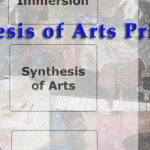Experiential Principle
Experiential Principle
The experiential principle reinforces the idea of encoding new knowledge through physical and direct experience, allowing interpretive reflection on the part of participants themselves. The experiences in which we engage are encoded into our nervous systems through the development of fibre connections in the brain (Goswami 2008, 387). This physiological encoding is enhanced when its presentation is not only cognitive, but also includes physical-based experience involving the motor system and other faculties. The integration of multiple senses during initial encoding of knowledge creates broader fibre connections for better recall (Goswami 2008, 389). For most students, absence of threat and a safe environment are essential in this encoding process. Also, the association of students’ previous knowledge with new knowledge enhances the encoding (Caine and Caine 1990). All these points are explained in detail in chapter 2 of Integrated Arts Pedagogy and Philosophy (Soyfer 2016, 43-134). (read dissertation here)
Bibliography:
Caine, Renate Nummela and Geoffrey Caine. 1990. “Understanding a Brain-Based Approach to Learning and Teaching.” In Educational Leadership, vol. 48, no. 2: pp. 66-70. http://www.ascd.org/ASCD/pdf/journals/ed_lead/el_199010_caine.pdf (accessed October 6, 2014).
Goswami, Usha. 2008. “Principles of Learning, Implications for Teaching: A Cognitive Neuroscience Perspective.” In Journal of Philosophy of Education, vol. 42, nos. 3-4, pp. 381–399. http://onlinelibrary.wiley.com/doi/10.1111/j.1467-9752.2008.00639.x/pdf (accessed February 1, 2015).
Soyfer, Nina. 2016. “Integrated Arts Pedagogy and Philosophy.” Canada: York University. http://yorkspace.library.yorku.ca/xmlui/handle/10315/32252 (accessed January 12, 2017).
Please note this page is a direct quote from Dr. Nina Soyfer’s dissertation “Integrated Arts Pedagogy and Philosophy” defended and archived in 2016. All rights are reserved and this quotation is provided here with permission for educational purposes.
Soyfer, Nina. 2016. “Integrated Arts Pedagogy and Philosophy.” Canada: York University, pp. 8-10. http://yorkspace.library.yorku.ca/xmlui/handle/10315/32252 (accessed 2017).
 Previous Post
Previous Post